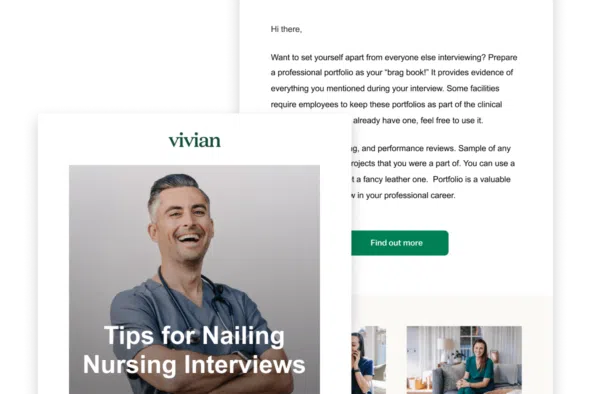If the freedom to decide where and when you want to work while building your resume and enhancing your career appeals to you, becoming a travel nurse might be precisely what you seek. Vivian wants to help you launch your travel nursing career. We’ll take you through each step, from getting licensed to starting your first job.
Why Travel Nursing?
Travel nursing lets you work while exploring new places and enjoying a more flexible lifestyle. Two of the biggest perks are more money and more opportunities. Travel nursing is a great way to advance your career because you can travel to where the best opportunities exist with job openings in prestigious facilities nationwide. Plus, travel nurses tend to earn higher compensation than staff nurses because they fill short-term needs, work hard-to-fill shifts, accept assignments where there are severe nursing shortages and have the flexibility to cover openings wherever needed. In the process, you’re expanding your professional network and nursing skills by working with a variety of professionals in various settings.
These are the five basic steps to becoming a travel nurse. Click on each step to learn more.
Step 1. Become an RN and Build 1 to 2 Years of Experience
This includes education, choosing a specialty and completing relevant certificates that increase your chances of getting higher-paying travel nurse jobs.
Step 2. Learn the Basics of Travel Nursing
Numerous differences exist between staff and travel nursing, like the application process, salary packages, housing and meal stipends, tax implications and more.
Step 3. Apply for Your First Job
This involves choosing a location, connecting with agencies, reviewing offers and endorsing your license in other states, if necessary.
Step 4. Get Ready to Go
Because you’re traveling and working, you have a lot of prep work, from finding housing to planning the fun parts.
Step 5. Tackle Day One on the Job
Healthcare facilities expect you to hit the ground running. Make sure you’re prepared through training and orientation.
Step 1: Become an RN and Build 1 to 2 Years of Experience
Your first big step on your travel nursing journey covers the same requirements of all registered nurses (RN), obtaining an active RN license. If you’re already licensed, congrats! The hardest part is over. Feel free to jump ahead to Step 2. For those just starting out, continue reading.
Graduate and Pass the NCLEX
To become a licensed RN, you must earn a two-year Associate Degree in Nursing (ADN) or a four-year Bachelor of Science in Nursing (BSN). While a BSN or higher can unlock more opportunities, it isn’t technically required for travel nursing. An ADN and 1 to 2 years of experience are sufficient for most entry-level positions. However, many employers prefer or even require a BSN. You must also pass state licensure requirements, and some states are leaning toward requiring RNs to have their BSN.
If you already have your ADN and are an RN, you can take an RN-to-BSN program to earn your bachelor’s degree quickly while still working. If you’re a certified nursing assistant or licensed practical nurse looking to pursue an RN degree, programs also exist to earn your RN credential quickly and cost-effectively.
Nursing programs must be accredited by the Accreditation Commission for Education in Nursing or Commission on Collegiate Nursing Education. They require coursework and clinical training hours. Upon completion, graduate nurses must pass the National Council Licensure Examination for Registered Nurses before applying for licensure in their practice state. If your home state is part of the Enhanced Nurse Licensure Compact (eNLC), you may qualify for a multistate license that makes traveling much easier.
Choose a Specialty
While you’re in nursing school, you choose a specialty. Nursing specialties requiring a broader skill set and more technical expertise, such as Intensive Care Unit, Emergency Room, Operating Room and Labor and Delivery nursing, often pay more, but you can earn similar compensation in more general nursing roles, like Med Surg and Telemetry. Whatever your specialty, you generally need 1 to 2 years of clinical experience in your specialty to be hired for travel nursing roles. Many specialties have opportunities to earn board certifications that make you a more desirable job candidate.
In early November 2022, some of the top-paying specialties for travel RNs posted on Vivian included:
| State | Avg Weekly Salary | Max Weekly Salary |
|---|---|---|
| Lactation Consultant | $4,176 | $4,600 |
| Flight | $3,896 | $4,300 |
| CVPICU | $3,776 | $6,184 |
| Pediatric CVOR | $3,637 | $5,068 |
| First Assist | $3,579 | $4,676 |
| PICU | $3,312 | $4,602 |
| CVOR | $3,386 | $6,314 |
| Labor & Delivery | $2,895 | $3,462 |
Land your First Staff Job
It takes hustle to land your first nursing job, but you’ll get there. Look for facilities with a nurse residency program or an orientation designed specifically for new graduates. Nail the job you want by talking up your ability to learn quickly, interact with patients and be part of the unit team. Most importantly, be willing to adapt to the needs of the facility.
Once you’re on staff, get involved on your unit and join committees. Don’t burn bridges. You need great references from your employer to become a travel nurse later. Focus on the now and be present so you can be an awesome travel nurse later. Most travel nursing positions require a minimum of one year of clinical nursing experience.
Step 2: Learn the Basics of Travel Nursing
If you’ve just started investigating travel nursing, you probably have a lot of questions related to how travel nursing differs from staff nursing. The biggest differences are the expectations, process and pay. Because travel nurses work short assignments, you’re expected to start in a unit with minimal orientation. When applying for jobs, you’ll likely work with a recruiting agency so the process is a little different. Finally, you must be well-versed in travel nurse pay to compare the opportunities in front of you.
Travel Nurse Compensation and Taxes
Travel nurse compensation has a very different structure. In many cases, you can expect to earn more than a staff nurse. Unlike staff positions, travel nurses may be eligible for tax-free stipends that cover housing, meals and incidentals. These compensations are on top of a base salary. You must crunch the numbers because a slightly lower base salary may be offset by tax-free stipends that lead to higher overall compensation.
These three guides can help you understand everything you need to know about travel nurse pay:
- Travel Assignment Pay Package Breakdown
- Understanding Travel Nursing Tax Rules
- Travel Nursing and Bill Rates
Check out Vivian’s 200,000-plus listings for U.S. travel RN jobs posted in early November 2022 to compare average salaries and compensation packages across positions, agencies and healthcare facilities.
Transferring Your License: It’s Easier than You Think
Many travel nurse jobs require you to have a license in hand to apply. Your first step should be understanding the requirements of the state where you want to apply. Visit Vivian’s RN Licensure Resource to learn licensure rules in all 50 states. Each state’s Board of Nursing website also provides valuable information.
You should already have your RN license in your home state. Most states offer “licensure by endorsement” to RNs with a current, valid license in another state. When applying, ensure you’re applying for licensure by endorsement, so you’re not applying to retake the NCLEX.
When applying for licensure by endorsement, at a minimum, states generally require you to complete a background check, verify your current license and provide state-issued identification. Staying organized is essential when you hold multiple endorsements that you must routinely renew if you plan on working in those states again.
States handle license transfers in different ways. Here are some examples:
- Compact license: If you have permanent residence in a state belonging to the eNLC and qualify for a Compact license, you can work in any other Compact state under your multistate RN license.
- Single state license: If you don’t qualify for a Compact license and only hold a single state license or the state that you’re applying for a travel nurse position isn’t part of the eNLC, you must apply for licensure endorsement. This can be a lengthy process that requires sending multiple pieces of documentation.
- Walk-through state license: Walk-through states allow you to receive a temporary license within a few days of your arrival.
We cover all these licenses in detail in our Guide to Travel Nursing and Licenses.
PRO TIP: Most travel nurse agencies reimburse you for all the associated costs of obtaining a license. Be sure to negotiate this point in your contract with your recruiter.
What’s a Recruiting Agency? Should I Work with One?
The short answer is: Yes! A travel nursing agency helps connect travel nurses with travel nurse jobs. Finding a travel nursing assignment is almost impossible without being associated with an agency, so it’s good to build these relationships. The travel nursing agency usually employs you, not the facility itself. Your recruiter at the agency manages your contract, compensation, travel and benefits. Use our Guide to Travel Nursing Agencies and Recruiters to find the right ones for you.
Step 3: Apply for Your First Job
When you’re ready to begin your travel nursing journey, it’s time to apply for your first job. A big part of finding a job is choosing a location. Once you know where you want to go, you can explore jobs in that area. You’ll usually work with a travel nursing agency, but you may work directly with an employer. Vivian lets you explore 1,000s of jobs in one place and read agency and employer reviews. You can save lots of time by creating a profile and sharing it with recruiters with jobs matching your preferences.
Choose a Location and Start Exploring Jobs
Narrow down your options to a few locations and start browsing jobs with Vivian. To help you with your research, explore our city pages and check out our Travel Guides. When comparing locations, consider the cost of living, weather, population, housing options and even local attractions, entertainment venues and nightlife to cover the fun aspect we mentioned earlier. Don’t forget to consider what you can expect to earn as a travel nurse by looking at average wages by state.
The top 10 highest-paying states for travel RN jobs in 2022 included:
| State | Avg Weekly Salary | Max Weekly Salary |
|---|---|---|
| New Jersey | $3,209 | $6,306 |
| California | $3,187 | $6,948 |
| Wyoming | $3,023 | $5,032 |
| District of Columbia | $3,003 | $6,049 |
| Minnesota | $2,969 | $6,321 |
| Oregon | $2,953 | $6,262 |
| North Dakota | $2,944 | $5,099 |
| Alaska | $2,893 | $5,006 |
| Pennsylvania | $2,892 | $5,209 |
| Nevada | $2,890 | $5,100 |
Connect with an Agency: Here’s How to Choose a Good One
Agencies work on your behalf to place you in the right job, but not all agencies are created equal. We offer tips for finding the best agency, but first, make sure they offer the types of jobs you’re looking for in your desired location.
When talking to a recruiter, some essential things to ask include:
- What are the benefits, and what expenses are reimbursed or covered by the agency as part of the onboarding and transition process? A contract should compensate you for any prerequisites like physicals, drug screens and fit testing.
- If you’re thinking about taking agency-provided housing, ask what’s included, like utilities, linens, kitchenware, etc.
- Does the agency have overtime and extra hours pay policies or is this facility-specific?
- What paperwork does the agency require? The minimum requirements for agencies usually include a resume, references and skills checklists. However, confirm there aren’t any extraordinary or unexpected conditions to sign a contract with the agency.
- Will you be working with one or multiple travel nurse recruiters? And how many other travel nurses does the travel nurse recruiter assist simultaneously?
Learn other questions to ask your travel nurse recruiter in our guide.
The Application: What to Expect and How to Make It Easier
Applying for a job doesn’t have to feel like a job in itself. Before applying for your first travel nurse job, you must perfect your travel nurse resume.
Creating a Vivian Universal Profile makes the application process much easier and faster. Instead of filling out 100s of job applications, you create a single profile and let the offers come to you. You can also explore jobs and chat with employers directly, all in one place.
The next step is preparing for interviews. Practice talking through your experience and share examples of how you can be adaptable, accommodating and willing to learn the facility’s methods. Hospitals want to know that you’re committed and capable of hitting the ground running.
Compare and Negotiate Offers
Avoid applying to the same facility with multiple agencies. Compare offers for facilities in the area and choose the one that best meets your location, salary and shift preference. If you’re claiming a permanent tax home, compare your base salary and tax-free stipends for each package offered. Expect the hourly wage to be comparatively low, but don’t worry; this works to your benefit. Travel pay can be complex, but we have resources you can use to help understand travel nurse salaries.
Step 4: Get Ready to Go
Think of a travel nursing assignment as an extended trip, generally lasting 13 weeks, but it could be more or less. You must secure housing, pack and do all the little things you’d do for a trip that’s not work-related. However, travel nursing assignments can get extended, as does your stay. You may also take several contiguous trips to other locations before you finally head home, so it takes even more planning.
Find Housing Like a Pro
Since travel nursing jobs are usually posted 6 to 8 weeks before the start date, you often have only a short window to secure housing. Some agencies still provide housing for travel nurses, but you may be able to save money by finding your own accommodation. The money you save goes into your pocket. Don’t forget things like utilities, furnishing, appliances, potential roommates and, if applicable, pet fees.
| Category | Items to Consider |
|
Location |
Public transportation, free or paid parking, garage access, distance from the hospital, proximity to necessities like grocery and gas |
|
Utilities |
If not included, costs of cable, WiFi, hot water, type of heat and average bill, central air, trash, sewer |
|
Amenities |
Linens, kitchenware, cleaning supplies, toiletries, towels, outdoor space, etc. |
| Appliances |
Microwave, washer/dryer (paid or in unit), dishwasher, TV, air conditioner |
| Roommates |
Quantity, gender, age, shifts worked, house rules, common areas, shared bathrooms, short-term/long-term, pet policy |
| Fees |
Security and initial deposits, pet-associated costs, refundable vs. nonrefundable fees |
There are many ways to find fully furnished short-term housing. Furnished Finder is one of the most popular websites to locate travel nurse housing, but several others can help you secure what you need.
Plan Your Journey and Pack Smart
Once you’ve got the job, it’s time to pack and plan your adventure. From choosing what to bring to how to pack and get there, you’ve got a lot on your mind. While it may seem overwhelming, it’s also part of the excitement.
Travel Nursing Apps that Make It Easy
Manage your schedule, travel smarter and maximize the experience. Some of our favorite travel nursing apps that help you along the way include:
- Vivian (Yes, we’re biased): Join a community of travel nurses, explore 1,000s of jobs and connect with employers directly, all in one place
- Nurse Grid: See schedules from home and request swaps with co-workers
- Culture Trip: Get great recommendations for tourist sites, museums, food and more in cities all over the world
- Spot Hero: Find parking in big cities where parking is often expensive and hard to find with this super helpful app
- Road Trippers: Explore excellent road trip itineraries or plug in your departure location and destination to find cool sites, historic landmarks and rest stops along the way
- GasBuddy: Find the cheapest gas and nearest gas stations with this free app, plus earn free gas with a Pay with GasBuddy card
Step 5: Tackle Day One on the Job
You made it! Here’s how to be successful, from the first day on the job to the end of your first contract.
Take Advantage of Orientation and Training
You’ll likely be asked to complete online onboarding before arriving at the facility. This usually includes uploading all your certifications, online orientation and pre-work for your unit. Onboarding usually also requires a physical within the past year, proof of immunization and a urine drug screen. If you need help with the process, reach out to the onboarding specialist at your agency for assistance.
It’s common for travel nurses to receive only 1 to 2 days of clinical orientation, sometimes even less, when they arrive at your temporary facility. Be ready to hit the ground running. This is what you’ve been preparing for and what your employer expects of you.
Dos and Don’ts on Your First Assignment
✔ Nail the basics by being punctual, being present and making friends.
✔ Focus on learning how the facility operates, how the team divides responsibilities and how you can plug in to make the team more efficient.
✔ Get involved and look for opportunities to gain new skills. A good travel nurse makes it better and easier for other travel nurses that may follow them at a facility.
Χ Avoid challenging the facility’s systems and core staff early on. You’re there to help out, not rebuild the unit or fix all the problems.
Χ Don’t be afraid to ask for help. If you’re unsure how to handle something, it’s worth the extra time to ask. Little mistakes can quickly become big mistakes that create more work for other people.
Extending Your Contract and Finding Your Next Job
After you complete your first assignment, you may love it so much that you want to stay. If you think this may be the case, let your recruiter know ASAP to ask for an extension.
Facilities that use a lot of travel nurses to supplement their staffing will usually offer an extension of your contract if you’re doing a good job. If you like where you’re at, discuss extending with your nurse manager to see if that’s an option.
Otherwise, hop on Vivian’s job board and start searching locations for your next adventure.







